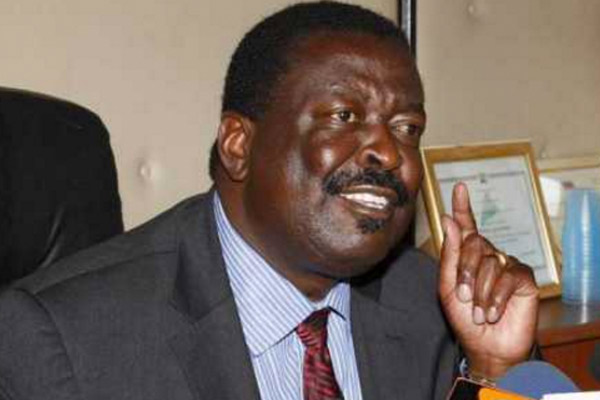By MUSALIA MUDAVADI
[dropcap]T[/dropcap]he Constitution of Kenya is the primary institution that holds the nation together. It is the mother of the Kenyan nation and the principal source of the laws of the land. Without it, there will be no country. There will be no nation and no law and order. Kenya will not exist as we know it today. Discussions on this institution, therefore, require sobriety of mind, clarity of focus and humility of approach, knowing that it is an institution that should serve both the present and future generations.
On the eve of independence, the founders of our Republic debated on the Independence Constitution for three years, in what are known as the Lancaster House Constitutional Talks. Without reaching agreement, the Kenyan nation would never have come into existence. After independence, the Constitution underwent many amendments that we now all agree were not in the best interest of the country. Hence, from 1990 – 2010, Kenya went through two decades of hostile campaigns for a new Constitution. The new Constitution became possible only after the rude and violent reawakening of 2007 – 2008. We promulgated a new Constitution on 27 August 2010, having taken heavy lessons on how not to handle constitutional matters. We must never forget those lessons.
The Constitution of Kenya 2010 is progressive in many ways. It has secured separation of powers in Government and – notably – given us a truly independent Judiciary. It has also brought power and resources closer to the people through devolution and expanded democratic space in a most progressive Bill of Rights. In its letter and spirit, the Constitution holds the promise of a better life for every Kenyan, entrenched in the essential values of human rights, equality, freedom, democracy, social justice and the rule of law. It also protects Kenyans against state-driven inequities
in development, poor governance, and poor service delivery.
The country is today witnessing fresh calls for another look into the Constitution. Those doing so have a right to make these calls. For the calls have constitutional protection. Articles 255 – 257 anticipate the possibility of the Constitution being amended. We cannot, therefore, demonize calls for constitutional review. Indeed, in the 2017 Presidential campaign, ANC committed itself to a review of the Constitution through the National Super Alliance (NASA) Coalition Agreement. Our position has not changed.
Yet – we reiterate – a review of the Constitution should be a careful exercise that is soberly done for the best interest of the country. It should not be a noisy and hostile exercise that starts looking like a jungle popularity contest that will only address a few people’s short-term interests. We regret that this is what seems to be happening.
Some people have rolled up their sleeves. They have thrown away their gloves and all caution. They are now ready for a purely rough political contestation, disguised as a call for and against reform of the Constitution.
We as ANC agree that there is need for some change. The whole country agreed on this even as we promulgated the Constitution in 2010. Yet, ANC believes in a rational approach to this very important exercise. We must isolate and separate the issues so that we are clear about what needs to go to a referendum and what can be changed through other avenues. Some of the challenges Kenya is facing today are, in fact, basic governance issues. Indeed, the Constitution is innocent on many charges that have been unreasonably leveled against it.
Consider some of these:
• stalled police reforms and reneging on aligning provincial administration to devolved government;
• ravaging negative ethnicity;
• massive corruption in the public sector;
• huge budget deficits;
• reckless borrowing that has put the country in a dangerous and embarrassing debt hole;
• Government’s wanton cannibalization of the citizenry through punitive taxation.
The Constitution is not guilty of these offenses against the citizens. We simply need to instill integrity and bring an end to the culture of impunity and poor governance. Answers to what ails the country are in Chapter Six of the Constitution on Leadership Integrity and public administration failure.
Over the past eight years, those charged with implementing the Constitution have done so only hesitantly. Sometimes, they have been outright unwilling to implement it – and, at other times, gone flat out to frustrate it. Retention of the Provincial Administration is a glaring example of defying the Constitution. Elsewhere, the preoccupation has been to dilute the Constitution through legislative and political licence – attempts have been made to undermine the Judiciary and other independent institutions, and to kill devolution.

This sends out a clear warning that left to its whims, a section of the political establishment in the country may tear the Constitution into unrecognisable pieces and reverse the gains. Review of the Constitution, accordingly, must be structured and all inclusive. It must be people-driven.
We expect that wise counsel will eventually prevail so that we can talk about what reforms should be made and even frame the questions. Many things will need to be addressed and they could get quite complicated.
For example:
• What do we do about the IEBC, both as the referee and as one of the institutions that need to be reformed? Here is the perfect case of the referee also being a player. How do we resolve this contradiction? Are we comfortable with the integrity of the referee?
• Is it about time we separated the dates and processes of the Presidential election from the Parliamentary and other elections?
• Should we continue with the present Presidential system of Government, or do we migrate to a Parliamentary system?
• How do we reduce the burden of the public pay bill in the legislature, both at the National and County levels?
What about the Executive?
• How can we make the recall Article in the Constitution work, in a just manner?
• What do we do about the two-thirds gender rule so that it works without burdening the taxpayer with huge numbers of nominated Members of County Assembly and Parliament, as well?
• How do we make the Executive truly inclusive, without seeming to be creating short-term positions for some specific individuals?
• How do we ensure that other marginalised populations are eventually brought on board, beyond tokenism?
• How do we make Article 10 finally work?
The questions are many and vexed. The Constitution review moment must, therefore, be a critical time to sort out these issues. The moment and the process cannot be fenced in by a small elite cabal that is engaged in a divisive jungle-style political popularity contest. A part of this domineering self-styled and self-focused elitist class is saying that there will be a referendum, “whether people like it or not.” Kenya must be cautious about this kind of superior attitude. This kind of chest thumping and fist waving is dangerous. Kenya needs dialogue, not fist waving.
We emphasise that the current referendum talk is vague – deliberately or otherwise. The referendum issues remain unclear and ambiguous. They make the debate to begin sounding dishonest and without ownership of the agenda.
It is a wild goose chase. Without a specific agenda to address, the debate begins bordering on a sneaky trick that is meant to occupy the political space and to take our sights away from the serious felt-issues facing this country. Even the basic question of whether to go to a referendum or not needs a structured conversation that involves and respects all shades of opinion on the matters that the referendum would address and the infrastructure, budget and timelines thereof.
We must, accordingly, avoid restricting ownership of debate to a small segment of the political elite who want to placate us with amendments of the kind that Kenya experienced in 1965, 1966 and 1982, such as abolishing devolved government and Senate; or expanding an already bloated Executive, or removing multiparty democracy, or abolishing the Presidential term limit.
READ: WHY WAIGURU IS A BETTER DANCER THAN YOU
Finally, we must ensure that we engage in a less disruptive, less costly and less polarizing process. Our sole purpose must be a secure people. To achieve that, we must be sincere and give meaning to the provisions of public participation embedded in the Constitution. The Constitution must be made to work for the people, and not the people for the Constitution and a few clever individuals. Our clarion call as ANC in this debate remains a firm Kenya kwanza – Kenya First!
- Musalia Mudavadi is the ANC Party Leader and Founder of NASA.












Leave a comment